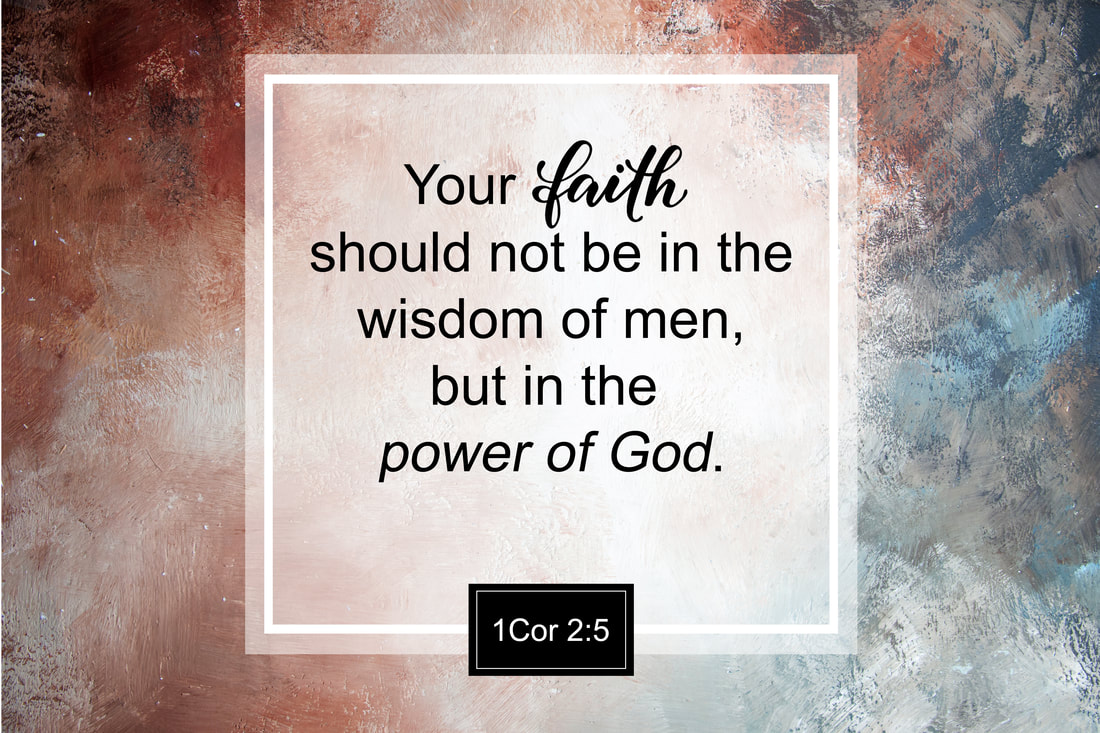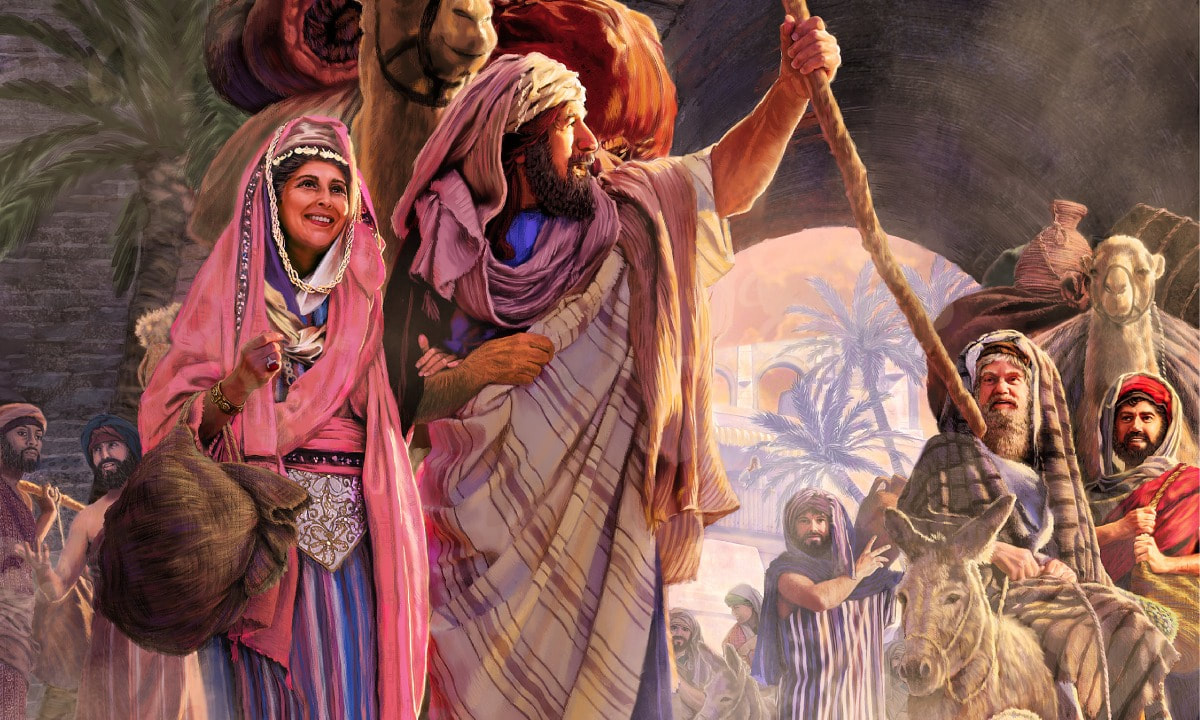|
We must have faith in God to please Him (Hebrews 11:6). Without faith, we are without God, His blessings, hope, Christ, and salvation. First, the Bible declares that pleasing God depends on faith in God’s grace through Christ, and not on our merit, morality, kindness, religious behaviors, or self-denial. To go to God, we must have faith that God is who He said He is: the Trinity God, who is just, merciful, all-knowing, and omnipresent, who hears every word we pray and blesses those who earnestly seek Him. Without faith, prayer is useless. The importance of faith is taught throughout the scripture. Justification, righteousness, and salvation are by faith through Christ, not by observing any laws. When you don’t trust a person, you can’t please him. A child always doubting his father won’t please him. To doubt God’s power or goodness is to insult Him. If you distrust that God will keep His promises, or if you question His power to save you or forgive your sin, you assume God is a liar (1 John 5:10). You can’t get anything from God if you don’t trust Him. Also, if you distrust God’s words, promises, or wisdom, you will have difficulty loving God or being zealous for Him; you won’t appreciate his discipline, nor rejoice in Him. There are many examples in the Bible. Through faith, Enoch experienced no death. Without faith, the Israelites couldn’t get into Canaan (Hebrews 11:5). We must examine our faith carefully. Do we have child-like trust in God’s words, or do we trust our knowledge, judgment, or invention more than God? We should integrate faith into every part of our life, such as teaching, working, making money, or raising our children. Trust that God will accomplish His work. Don’t be afraid of trouble; trouble helps us grow. We tend to trust God the most when things are the worst. Don’t trust yourself or your work for salvation. Trust Christ’s work. God promised never to leave or forsake us (Deuteronomy 31:8). Whatever God has promised, He can and will perform! So, trust Him. Not by might nor by power but, it is by God’s Spirit that anything is accomplished (Zechariah 4:6). A summary of a sermon by Charles Spurgeon: https://www.youtube.com/watch?v=sDAGy1jXuqY&t=1s 如何取悦上帝 人必须信上帝才能取悦祂(希伯来书11:6)。如果人没有信、就没有神、没有神的赐福、没有盼望、 没有基督、也没有救恩。 首先,正如圣经所宣告的那样,取悦上帝取决于信。相信藉着基督赐下的上帝的恩典、而不是自己的功劳、道德、仁慈、宗教或克己的行为。 若要到上帝面前,必须相信上帝就是祂所说的那样:祂是三位一体的上帝,满有公义、怜悯、全知、全在; 祂垂听人每一句的祈祷,也赏赐那恳切寻求祂的人。没有信的祈祷是毫无功效的。 整本圣经都教导信的重要性。称义、公义和救恩都是因信靠基督、而不是靠遵守任何律法。 当你不信任一个人时,就无法取悦他。 一个总是怀疑父亲的孩子是不会取悦他的。 如果怀疑上帝的大能或良善,就是在侮辱祂。如果不相信上帝遵守祂的应许,或质疑祂拯救你或赦免你罪的能力,就是以上帝为说谎者(约翰一书5:10)。 如果不相信上帝,就无法从上帝那里得到任何东西。 此外,如果不相信上帝的话语、应许或智慧,就将很难爱上帝,对祂有热心,也不会忍耐祂的管教或以祂为乐。 圣经中有很多关于信心的例子。以诺因着信没有经历死亡,以色列人因没有信而无法进入迦南地(希伯来书 11:5)。 仔细查验自己的信心:对上帝的话语有孩童般的信靠,还是相信自我的知识、判断或发明超过上帝? 将信心融入生活的每个部分,例如教学、工作、赚钱或抚养儿女。相信上帝必要成就祂的工作。 不要害怕麻烦; 困难帮助人成长。事情最糟糕之时往往是人最信靠上帝的时候。 不要靠自己或自己的工作赚取救恩,要信靠基督的赎罪大工。 上帝应许永远不会撇下或丢弃我们(申命记31:8)。无论上帝应许了什么、祂都能也必成就。所以,相信祂吧! 不是靠势力或才能,而是靠上帝的灵方能成事(撒迦利亚书 4:6)。
0 Comments
God shows His greatness by working for His people (Acts 17:25). He doesn’t actually need our service, but He gives us everything we need (2 Chronicles 16:9).
God doesn’t need your help. In the day of trouble, you call on Him. He saves you and you glorify Him (Psalms 50:15). Don’t trust your intelligence or technologies but trust God. He works for those who wait for Him (Isaiah 64:1-4, 30:18; Psalm 20:7). Our God is unique. Isaiah contrasted Him to the Babylonian idols. God sustained, rescued, and showed the Israelites compassion from birth to death. But the Babylonian idols were their burdens instead (Isaiah 46:1-4). Christ came not to be served but to serve, even by giving His life, treating us far better than we deserve (Mark 10:41-45). God not only wants to help us, but He is also infinitely competent (Isaiah 46:9-10). So, pause and pray to God. Consult Him, particularly when you aren’t sure what to do according to His will. If God tells you to be still, you should let Him take over and just quietly observe (Exodus 14:13-14). God told the Israelites to wait for Him, and not to run to Egypt for help or fight for themselves. But they fought and quickly lost (Isaiah 30:15-16, 31:1). God may fight for you as He split the Red Sea for the Israelites. Or He may fight through you as He helped David swing the stone at Goliath. If God tells you to act, then let Him work through you (Isaiah 41:10). Note that even when you are charging on your war horses, you still wait for the Lord, listening to His voice (Psalm 33:16-22). Also, when you are working hard, know that it is God’s grace working in you (Proverbs 21:31, 1 Corinthians 15:10). Greatness is not measured by how many people work for you, but by you working for many, lifting them up, like Christ sacrificing His life for us. Never act as if you are in charge and God is irrelevant. Remember all authorities in heaven and earth are His. Always maintain an open channel with God and pray to Him. If He wants you to be still, then stand back and observe God acting on behalf of those who wait for Him (Isaiah 64:4). Summary of a sermon by John Piper https://www.youtube.com/watch?v=G6t-iFeVavw 上帝为等候祂的人行事 上帝通过为祂的子民行事而彰显祂的伟大(使徒行传 17:25)。 祂其实不需要人来服侍,反倒赐下我们需要的一切(历代志下 16:9)。 上帝不需要你的帮助。 在患难之日,你求告祂, 祂就拯救你,而你也要荣耀祂(诗篇 50:15)。 不要相信你的智慧或科学技术,而要相信上帝。 祂为那些等候祂的人行事(以赛亚书 64:1-4,30:18; 诗篇 20:7)。 我们的神是独一无二的。 以赛亚将祂与巴比伦的偶像对比。 从出生到死亡,上帝都托住、拯救并向以色列人施怜悯。 但巴比伦的偶像却是他们的重担(以赛亚书 46:1-4)。 基督来不是要受人服事,而是要服事人,并且舍命,恩待我们远比我们应得的好太多(马可福音 10:41-45)。 上帝不仅想帮助我们,而且祂也有无限的大能(以赛亚书 46:9-10)。 所以,当停下来向上帝祈祷,寻求祂的意思,特别是不确定如何按照祂的旨意而行时。 如果上帝告诉你要安静, 你便应该让祂接手作工, 然后安静地观察(出埃及记 14:13-14)。 上帝告诉以色列人要等候祂,不要投奔埃及寻求帮助或为自己争战。 但他们却不听从而擅自战斗,结果很快失败了(以赛亚书 30:15-16, 31:1)。 上帝可能像分裂红海一样为你而战,也可能像帮助大卫向歌利亚挥石一样通过你来战斗。 如果上帝告诉你行动,就让祂通过你行事(以赛亚书 41:10)。 请注意即使当你骑着战马冲锋陷阵时,仍要等候耶和华,总要听祂的声音(诗篇 33:16-22)。 此外,当你努力工作时,也要知道这是神的恩典在你里面运行(箴言 21:31,哥林多前书 15:10)。 伟大不是用有多少人为你工作来衡量,而是你为很多人工作,高举他们,就像基督为我们牺牲生命一样。 不要表现得好像你在作主,而上帝无关紧要。 记住天上地下所有的权柄都是祂的。 当始终与上帝保持畅通的交流的渠道,向祂祈求祷告。如果祂要求你保持静止,那么退后一步,观察神为那些等候祂的人行大事(以赛亚书 64:4)。 We need faith to please God (Hebrew 11:6). How do we walk by faith and not sight (2 Corinthians 5:7)?
Many suffer, not getting God’s promises (Hebrew 11:39-40). Through suffering, we learn. In this fallen world, we won’t understand many things. Trust that God is good, with better plans and eternity to keep His promises. To have such faith, read His words (Romans 10:17). Focus on His power. Remember what He has done for us and look forward to the joy before us. Our anchor is Christ; He is the same yesterday, today, and tomorrow. “Trust and obey, for there’s no other way.” Summarized from two Rick Warren’s sermons: https://www.youtube.com/watch?v=SQNP6dQj20c https://www.youtube.com/watch?v=xz6ow5ad7T0 怎样才能凭信心而行? 没有信心的人不能得到上帝的喜悦(希伯来书 11:6)。 如何行事为人凭对上帝的信心,而不是凭眼见呢(哥林多后书 5:7)? 1. 信就是对所盼望之事的把握,是还没有看见之事的明证(来 11:1)。 信心能看到尚未发生之事,在它们发生之前提前看到。 伟大的成就需要在行动之前已经相信所行之事会成就。 2. 信要求我们在不明白的时候顺服上帝。 诺亚虽然从未经历过雨水,仍然建造了方舟(希伯来书11:7)。 富裕的亚伯拉罕七十五岁的时候,没有从上帝那里得到任何细节,便离开了他的家乡(希伯来书11:8)。 以色列人走过红海时,水才分开(希伯来书11:29)。 玛丽亚因顺服而童女怀孕(路加福音 1:38)。 就像父母不向年幼的儿女解释一样, 上帝也不欠我们任何解释。 3. 当自己不喜欢的时候仍然坚持不懈。 虽然还没有看到成果,但任然坚持不放弃(希伯来书11:27、11:1)。 即使包括自己在内也没有人想继续做下去的时候, 伟大的人通过坚持不懈来完成大业。 4. 在拥有之前就宣布拥有。 信心之言蕴含着巨大的力量。 亚伯兰将自己的名誉置于危险之中,在九十九岁时改名为亚伯拉罕(许多国家的父亲)。 那时他和妻子没有儿女, 甚至至少最初时他也对上帝的应许持怀疑态度(罗马书 4:17,希伯来书 11:22,创世记 17:17) 5. 在尚未拥有之时就给予。 爱必须给予。 要像上帝一样,祂是给予的上帝(约翰福音3:16)。 金钱考验信心。如果在永恒的救恩上相信上帝,在财务上也应信靠祂。 先奉献给神,神必会供应(箴言3:9-10)。通过给予来操练信心,就像锻练肌肉一样. 这样就可以经历上帝的拯救。 6. 在收到之前感谢上帝。 在得到所求的之前,当感谢上帝, 好像已经得到了(马可福音11:24,马太福音9:27-30)。以色列人在高大坚固的耶利哥城墙周围走了七天,不住地感谢上帝。然后,城墙就倒塌了(希伯来书11:30)。 7. 如果没有得到,仍然坚信不移。 许多人经受苦难,却没有得到上帝的应许(希伯来书 11:39-40)。 生活在一个堕落的世界, 很多事情我们都不明白。 相信上帝是良善的,祂有更好的计划和永恒来信守祂的诺言。并且通过苦难我们也能学习功课。 如果想要拥有这样的信心,请阅读祂的话(罗马书 10:17)。 专注于祂的大能。 记住祂为我们所做的一切,并期待我们前面的喜乐。 我们灵魂的锚是基督,祂昨天、今天、明天都是一样的。 “信靠顺服,此外不能蒙福。” Many seek wisdom, but our wisdom cannot lead us to God. Our redemption depends entirely on Him, so that no one can boast (1 Corinthians 1:29-31). Instead, God is glorified in our dependence.
First, the redeemed absolutely depend on God; He is the source of all the good in the redeemed. Redemption is from God. The Father gave us Christ and has accepted Christ’s life for ours. God is not obligated to redeem us; He could have rejected us like He did the fallen angels. Our redemption is God’s grace, a gift that we cannot repay. Our faith in God is also from God (Ephesians 2:8). God gives us wisdom to know Him. We are considered good and holy before God because of God. (1 Corinthians 1:29-31). We are reborn, like being raised from the dead, through the redemption (Ephesians 1:19, 2:10, 5:24; 2 Corinthians 5:17). We are given the Holy Spirit, as promise by the Father, enabling Christ to be in us (1 Corinthians 1:29-31). With the Holy Spirit in us, rivers of living water will flow from us. The Holy Spirit also serves as a deposit, guaranteeing what is to come (Galatians 3:13-14; Luke 24:49; Ephesians 1:13; John 4:14, 7:38-39; Revelation 2:1; 2 Corinthians 1:22). We are preserved and protected by God (1 Peter 1:5). We are sufficient because of God (2 Corinthians 4:7). He is not just the source of all that is good, but the medium through whom we receive it. Through Christ, our mediator provided by Father, we receive our redemption (Hebrews 7:27, 9:26), and we are reborn, becoming good (2 Corinthians 5:21, 1 Corinthians 8:6). God is not just the purchaser, He also has paid the price with the ultimate sacrifice. Not just the source of all good and the medium to get them, God is the good itself. Everything good that sustains us and brings us joy—such as food, health, etc.—is in God. All that is good within us—the excellency of our soul, our divine nature, our holiness, and our happiness—comes from God, who resides in us as the Holy Spirit (2 Peter 1:4, Hebrews 12:10). Second, God is glorified in the work of our redemption. The more we depend on God, the more we see God and God’s glory. We see God’s greatness and our nothingness. So, we must rely on God alone for our redemption. Trust Him absolutely. Praise and exalt God alone. Ascribe all glory to God. Summary of a sermon by Jonathan Edwards. https://www.youtube.com/watch?v=gbQQtpoIwMM 上帝从人的倚赖得荣耀 许多人寻求智慧,但人的智慧无法将他引到上帝那里。救赎完全取决于上帝, 因此没有人可以自夸。 相反地,上帝从我们的倚赖而得荣耀 (哥林多前书 1:29-31)。 首先,被救赎的人绝对倚赖上帝。 上帝是被赎者一切美好的源头。 救赎来自上帝。父神将基督赐给我们,以基督的生命代替我们的生命。上帝没有义务救赎我们,原本可以拒绝我们像拒绝堕落的天使一样。救赎是上帝的恩典,是我们无法偿还的礼物。 人对上帝的信心也来自祂(以弗所书2:8)。上帝赐人智慧来认识祂。因为上帝,我们在祂面前被认为是良善和圣洁的 (哥林多前书 1:29-31)。 我们籍着救赎得以重生,就像从死里复活一样(以弗所书 1:19、2:10、5:24;哥林多后书 5:17)。 我们被赐予圣灵,就是天父所应许的圣灵,使基督能在我们里面(哥林多前书 1:29-31)。有了圣灵在里面,活水的江河就会从中流出。圣灵也作为凭据,保证将要发生的事(加拉太书 3:13-14;路加福音 24:49;以弗所书 1:13;约翰福音 4:14,7:38-39;启示录 2:1;哥林多后书 1:22)。 上帝一直在托住我们,保护我们(彼得前书 1:5)。我们因为上帝而充充足足(哥林多后书4:7)。 上帝不只是一切美善的源头,还是获得美善的唯一渠道。 我们籍着父神所提供的中保基督得到救赎(希伯来书 7:27, 9:26),重生成为良善的人(哥林多后书 5:21, 哥林多前书 8:6)。上帝不只是买主,祂也付出最终的牺牲作为代价。 上帝不只是获得一切美善的源头和渠道,祂就是美善的本身。 在我们之外带来快乐的一切美好事物,例如食物、健康等,都在上帝里面。在我们内里所有的美好,灵魂的卓越、神圣的本性、圣洁和幸福,也都在上帝里面(彼得后书1:4,希伯来书12:10)。 其次,上帝在救赎我们的工作上得着荣耀。 我们越倚靠上帝,就越能看见上帝和祂的荣耀,看见上帝的伟大浩瀚以及自己的虚无渺小。 所以,必须单单倚靠上帝的救赎,完全绝对地相信上帝,唯独赞美和高举祂,将一切荣耀归于祂。 Many of us made resolutions at the start of 2020. Some of us are the type of person described in James 4:13: Either today or tomorrow we will go to a specific city, spend one year there, to carry on a business and be profitable.
COVID-19 has turned everything upside down. No one knows the future (Ecclesiastes 8:7). What should we do? Let us learn from James 4:13-17. First, note that the planner in James 4:13 did not consider whether God would approve the plan. We should let God be the center of our plan. Then God will direct us (Proverbs 3:5-6). Also ask God to show us how to carry out the plan He lays out for us (Psalm 119:32). Be humble and fully trust Him. Ask God for wisdom, and He would give it to us (James 1:5). Second, do not presume to have a future. We do not know the first thing about tomorrow (Proverbs 27:1). Our life is temporary, like a morning mist that quickly vanishes. So, do not boast or brag what you are going to do tomorrow. This is arrogance. We can live and do anything, only if it is God’s will (James 4:15-16). Also, do not worry about tomorrow, as such worry robs us of today. Each day has enough trouble of its own (Matthew 6:34). Ask God to give us what we need today. Plan for tomorrow but live for today. Finally, if we know the good things we ought to do, we should do them (James 4:17). Not doing what we should is a sin of omission. Do not procrastinate; we are not guaranteed tomorrow. So, plan how to do it and act. Action speaks louder than words (1 John 2:3-4). In conclusion, though our future is completely uncertain, we should still plan with God in the center. Make it God’s plan for our life, but do not presume we have tomorrow because we may die tonight. We live only if God permits. Do not worry about tomorrow. If there are good things you ought to do, do them. Make each day count. Summarized from a sermon by Rick Warren at: https://www.youtube.com/watch?v=k-5eRVIfqhU 面对难以预料的未来 许多人在2020年开始的时候都制定了各种计划。 有些可能像雅各书 4:13中描述的一样:今天或明天将去这个城市,在那里度过一年,开展业务并赚钱获利。 谁知新冠肺炎使一切都不一样了。 没有人知道未来 (传道书8:7)。 那我们该怎么办呢?让我们从雅各书4:13-17中学习。 首先,雅各书4:13中的计划者没有考虑上帝是否会批准他的计划。计划的中心应该是上帝。 如此,上帝就会指明我们的路 (箴言3:5-6)。 也当请求上帝显明如何行在祂所安排的路上 (诗篇119:32)。 要谦卑并完全信靠上帝。请求上帝赐下智慧, 祂就会把智慧给我们 (雅各书1:5)。 第二,不要以为一定有将来。 不知道明天一早会发生什么(箴27:1)。生命是暂时的,就像很快消失的晨雾一样。 所以,不要夸口明天要做什么,这是狂妄自大。我们可以存活和做任何事都是神的旨意 (雅各书4:15-16)。 另外,不要为明天担忧。 担忧未来使我们失去现在。每一天都有它自己的难处(马太福音6:34)。求上帝賜給我們今天的需要。可以为明天计划,但要为今天而活。 最后, 如果知道应该做的善事,那就去做(雅各书4:17)。 不如此行就犯了忽略的罪。不要有意拖延,不能保证有明天。所以,先制定计划, 然后就去做。行动胜于雄辩(约翰壹书2:3-4)。 总而言之,尽管前途未卜,仍应该以上帝为中心制定计划,让它成为上帝对我们生命的计划。 但不要以为一定有明天,因为我们今晚可能就死去。每个人得以生存完全是出于上帝的许可。 不要为明天而担忧。 若有应该做的善事,那就立刻去做。 每一天好好地活出有意义的生命。 We do not always understand why God lets certain things happen, but we are not the first to have such confusion. Let’s look at how Christ confused Mary and Joseph.
When he was twelve years old (a year before adulthood in their culture), Jesus went with Mary and Joseph to Jerusalem for Passover. When the event was over, His parents left for home with a large group, but Jesus stayed behind discussing with teachers in the temple (Luke 2:41-52). A day later, when Mary and Joseph found out Jesus was not with them, they went back to Jerusalem to look for Him. After three days of searching, they found Him. Mary was not pleased, asking why He treated them like this. In response, Christ questioned why they did not know He had to be in His Father’s house (v49). During this event, Jesus called God, not Joseph, His Father. In the Old Testament, God is rarely referred to as Father. Basically, Jesus told them His relationship with God was much more important, and He did not have to obey them. Mary and Joseph were disturbed by how Christ treated them. They did not understand what He was talking about (v48-50). James Elliot was speared to death while trying to evangelize to Indians in Ecuador. Shouldn’t God have protected him? Later, his wife Elisabeth explained: God’s plan is beyond us, and we should accept it as is. Often, we are confused by what God does in our lives. We do not understand why we are in huge storms. Accept them. Hold onto His love for us. Christ, the almighty God, came on earth to serve us till death. We should contemplate what we know about Him and treasure our experience of Him (v51). Gradually, through grace, we will grow in our understanding of Him. Meanwhile, keep trusting and serving Him. Summarized from a Tim Keller’s sermon: https://gospelinlife.com/downloads/jesus-at-his-father-s-feast-5439/ 接受我们的困惑 我们时常不明白为什么上帝让某些事情发生。我们并不是第一个有这样困惑的人。让我们来看基督曾如何让马利亚和约瑟感到困惑。 耶稣十二岁那年,祂与马利亚和约瑟一起去耶路撒冷过逾越节。在他们的文化里, 祂还差一年就成年了。 守满了节期,当马利亚、约瑟和一大群人离开时,祂独自留下来与圣殿里的老师讨论 (路加福音2:41-52)。 过了一天以后,马利亚和约瑟发现耶稣不见了,便返回耶路撒冷去寻找祂。经过三天的搜寻,他们终于找到耶稣。马利亚不高兴,问祂为什么要这样对待父母。耶稣反问他们为何不知道祂必须在祂父的家里(路加福音2:49)。 在这件事中,耶稣称上帝(不是约瑟)为祂的父亲。在旧约时代,上帝很少被称为父。基本上,耶稣在告诉自己肉身的父母,祂与上帝的关系重要得多,祂也不必服从他们。基督的行为使马利亚和约瑟感到不安,他们不明白祂在说什么(路加福音2:48-50)。 詹姆斯·艾略特(James Elliot)在厄瓜多尔(Ecuador)对印第安人传福音时被刺死。难道上帝不应该保护他吗?后来,他的妻子伊丽莎白解释说:“上帝的计划超越了我们,所以应该接受发生的一切。” 今天,我们时常对上帝在我们生活中所做的事感到困惑,不明白祂为什么让我们面临巨大的风暴。 接受这些暴风骤雨吧!持守祂对我们的爱。基督,全能的神, 来到世上服侍我们,为我们死在十字架上。默想我们对祂的认识,珍惜在祂里面的经历(路加福音2:51)。籍着恩典,我们将逐步更多地认识祂。与此同时,继续信靠祂,服事祂。 Money solves lots of problems, and we need it to live. But how important is material wealth to us?
Many of Christ’s parables are about wealth because our attitude towards it is a window into our hearts. Let’s look at Christ’s viewpoint on possessions via the parable in Luke 12:13-21. The person there kept storing up things, thinking they would bring him security and happiness (v18). Christ called him a fool (v20), which is very rare. If he died that day, he wouldn’t have been able to enjoy any of his possessions. The physical world is temporary and is not all there is. Christ had no material wealth on earth, and yet He is worshipped by more than anyone today. Don’t trust earthly things more than God. “Let me have this car.” “Help me succeed in this deal.” “Make this woman love me.” “Get me this house.” “Make me beautiful.” “Build up my muscles.” Don’t look to earthly things to give us genuine security and happiness. Only God can do that. Don’t place our hope in earthly things, but in God and His plans. Focus on investing in God’s kingdom and His words, which last forever (v21). Be rich in Christ. Christ gave up His heavenly riches to become poor on earth. His sacrifice draws us to God. Through Christ, we become rich and good in God’s eyes (2 Corinthians 5:21, 8:9). Also, focus on people rather than gathering riches for ourselves. Luke 16:9 talks about a shrewd manager putting money into people, something that lasts. It is wise to save but be generous. Generosity can show our faith in God and our hope for the future. Generosity shows our love for others. Don’t focus on loving yourself but love our neighbors as yourself. But don’t be good to others just to claim a place in paradise. Our goodness is far from God’s standards. We are good before God only through Christ, not through our behavior. In conclusion, earthly possessions are temporary. Focus on God’s kingdom and His words. Focus on others. Summarized from a Tim Keller’s sermon, titled, “Money Can Make Us Fools”: https://gospelinlife.com/downloads/how-money-makes-us-fools-6521/ 为什么傻瓜专注于金钱? 金钱可以解决很多问题,人也需要金钱来生活。 但物质财富对我们到底有多重要呢? 基督的许多比喻都涉及财富,因为人对钱财的态度是窥见他内心的一扇窗户。 让我们来看基督在路加福音12:13-21比喻中对钱财的看法。经文中的那人不停地储蓄财富,认为这会带来安全和幸福. 路加福音12:18。基督称他为傻瓜,这是非常罕见的. 路加福音12:20。那人如在当天去世,便无法享受任何储蓄之物。物质世界是暂时的,并非一切的所有。基督在世上时没有金银财产,然而今天却比任何人都更受敬拜。 不要倚赖任何属世的事比倚赖上帝更多。 “让我拥有这辆车”,“帮助我成功地完成这笔交易”,“让这个女人爱我”,“让我得到这个房子”,“ 让我更美丽,更强壮”,… 属世的事物不能带来真正的安全和快乐. 只有上帝才能。不要把希望放在属世的事物上。相反地,应该把盼望放在上帝和上帝的计划上。 专注投资天国和祂永恒的话语. 路加福音12:21。 应当在基督里富足。基督放弃了天上的财富,成为地上的穷人。祂的牺牲将我们吸引到上帝面前。我们藉着基督在上帝的眼中变得富足而美好. 哥林多后书5:21, 8:9。 专注于他人而不是为自己积累财富。 路加福音16:9谈到一个精明的管家把钱投资在人身上,因为这是永恒持久的。 储蓄是明智的, 但同时要慷慨大方。 慷慨可以表明对上帝的信任和对未来的盼望,同时也表明了我们的爱。不要专注爱自己,要爱邻如己。 对他人行善的动机不应是为了在天国占有一席之地。人的良善远不能达到上帝的标准。只有籍着基督才能使我们在上帝面前被看为好。 总而言之,地上的钱财是暂时的。专注天国和祂永恒的话语。专注于他人。 God told Abraham (1) he should leave his home land, without telling him where to go; (2) He would make him a great nation, without telling him where this nation would be; (3) all people would be blessed through him, without telling him how he could have a child at his old age; and (4) to sacrifice his child, without telling him why (Genesis 12, 22).
Each time, Abraham believed God (Genesis 15:6). He trusted and anchored himself in God’s words, not his own abilities, possessions, relatives, friends, or looks. But Abraham did struggle in his faith. For example, he asked God how he could be sure of His words (Genesis 15:8). God told Abraham to get a few animals. At once Abraham knew God intended to sign a contract with him (Genesis 15:9-10). In their culture, to seal a deal, both parties each got an animal, cut it into pieces, and grouped them into two columns; and then both walked between the columns, showing symbolically the party breaking the deal to be cut into pieces (Jeremiah 34:18-20). In this case, it was different. A blazing torch passed between the two columns. The torch signified God, as in Mount Sinai and the pillars of fire in the desert. The process represented God making a deal with Abraham (v17-18). But only God walked between the columns, meaning that if Abraham failed, God would take the punishment of being cut into pieces. God’s action enabled Abraham to live a life of faith. Keeping His promise, God took the curse for our sins; Christ was ripped into pieces and was cut off from God the Father (Mark 15:33, Isaiah 53:8). We worry, disobey, and doubt God. We think if we trust all the way, we will miss out. Like Abraham, John the Baptist also had doubts. John asked Christ whether He was the one. We can do the same. We can ask God, “How can we know you will follow through?” “How can we know we wouldn’t let you down?” Then, listen to His response. Remember that Christ already paid the price, by Himself. May we believe Him and anchor in His words. May God be our shield and our reward (Genesis 15:1). Summarized from a Tim Keller’s sermon, titled, “Abraham’s doubt and trust”: https://gospelinlife.com/downloads/abraham-and-the-torch-5860/ 亚伯拉罕怀疑神吗? 上帝告诉亚伯拉罕(1)离开他的家乡,却没有告诉他要去哪里; (2)上帝会使他成为一个伟大的国家,却不告诉他这个国家将在哪里; (3)万族都会通过他被祝福,却没有告诉他老迈的时候还可以有孩子; 和(4)把他的儿子献在祭坛上,却不告诉他为什么 (创世纪12:22)。 亚伯拉罕每次都相信上帝 (创世纪15:6)。他坚信上帝的话语,而非自己的能力、财产、亲戚、朋友或外表。 然而亚伯拉罕确实在信仰上经历过挣扎。他曾问上帝如何能确定上帝话语的可靠 (创世纪 15:8)。上帝便告诉亚伯拉罕找一些动物来。他立刻知道上帝打算与自己签订合同 (创世纪15:9-10)。在那时的文化中,为了达成协议,各方找一些动物切成块状,分成两堆,然后双方从它们中间走过。这代表着如一方违约,他就会像这些动物一样被切成块状(耶利米书34:18-20)。 这次的仪式与以往不同。上帝在两堆之间飘来一支燃烧着的火炬。火炬代表着上帝,好像在西奈山和旷野中的火柱一样。这个过程代表着上帝与亚伯拉罕达成协议(创世纪17-18),但是只有神走在两堆肉块之间, 而亚伯拉罕不用走过。 上帝如此行乃是要告诉亚伯拉罕,如果亚伯拉罕不遵守协议,自己会取代他的位置,接受惩罚,被切成肉块。上帝的行动感动了亚伯拉罕,让他从此对上帝充满了信心。 上帝实现自己的应许,为着我们的罪接受了诅咒. 基督与父神隔绝开来,被撕成碎块 (马可福音15:33,以赛亚书53:8)。 我们担心忧虑,悖逆怀疑上帝,认为如果全然信靠上帝便会错过很多。 施洗约翰像亚伯拉罕一样也有过疑虑。约翰问基督祂是否那人。我们也可以这样做。我们可以问神,“怎么知道你会坚持到底?怎能知道我们不会让你失望?” 提问以后聆听祂的回应。 请记住基督已经亲自付出了代价. 愿我们坚信基督与祂的话语。愿上帝成为我们的盾牌和赏赐 (创世纪15:1)。 Three global religions consider Abraham as the father of their faith. Because of a call from God, he lived a life at odds with his family, society, and culture. Let’s learn about it in Genesis 11:27-12:9.
Genesis 1-11 described human’s spiritual decay. But one ray of hope, a single family, still passed on the knowledge of God: the family of Seth (Genesis 4:25), from whom came Noah and Terah, the father of Abraham. At that time, the culture was polytheistic; even Terah worshiped other gods (Joshua 24:2). Fortunately, his son Abraham followed God. But Abraham’s wife, Sarai, was barren. So, this ray was flickering out, spiritually and physically. Then God called Abraham. It was a call of grace because Abraham didn’t deserve the call. Abraham wasn’t qualified. The call changed him. The call was radical. God told Abraham to leave his country, his people, and his father’s household and go “to the land I will show you” (12:1). Note that at that time, there was no Google map. By faith, Abraham went, not knowing where (Hebrews 11:8). God promised Abraham that he would be a great nation, and all peoples on earth would be blessed through him. But Abraham never witnessed this. For his entire life, Abraham lived between God’s promises and the reality. He might have been more comfortable just staying back in his father’s land, but instead he listened to God. Over thousands of years, all the promises gradually are coming true. Like Abraham, we follow God by faith. Our life is between God’s promise and the reality. We may be more comfortable just living our old life. But all of God’s promises eventually will come true. God promised that through Christ (who left His Father’s house, came on earth to suffer and die for us), we can be welcomed back to the Father’s house, with all the glory and blessing. God’s call does not fit into our agenda. God’s call probably challenges major aspects of our lives. God’s call probably will take us out of our comfort zone. But trusting God’s call provides real security and gives us entirely new lives with radical new purposes. Trusting God will bring us to the ultimate promised-land. Summarized from a Tim Keller’s sermon, titled, “God’s Thousand-Year Promises to Abraham”: https://gospelinlife.com/downloads/real-security-and-the-call-of-god-5229/ 上帝对亚伯拉罕的千年应许 全球性的三大宗教都以亚伯拉罕为信仰之父。因为上帝的呼召,他过着与家庭,社会和当时文化相抵触的生活。让我们从创世纪11:27-12:9学习亚伯拉罕的生命。 创世纪1-11描述了人类的属灵衰退。但如一线微光的希望,有一个家庭仍然传递着对上帝的认识,这就是塞特的家族. 创世纪4:25。 诺亚和特拉便是从它而来。 特拉是亚伯拉罕的父亲。那时的文化是多神教,甚至连特拉都崇拜其它的神灵. 约书亚记 24:2。所幸的是他的儿子亚伯拉罕跟随上帝。但亚伯拉罕的妻子撒莱却不能生育。所以,这束微光在属灵上和肉体上都在渐渐熄灭。 就在这时, 上帝呼召亚伯拉罕。这是恩典的召唤,因为亚伯拉罕不够资格,不配得到这个呼召。然而,这个呼召改变了他的一生。 这也是一个根本而彻底的使命。上帝告诉亚伯拉罕离开熟悉的本土、本族和父家,“往我所要指示你的地方去.” 创世纪12:1。 请注意当时还没有谷歌地图。亚伯拉罕凭着信心就去了,虽然不知道要去哪里. 希伯来书11:8。 上帝应许亚伯拉罕他将成为一个伟大的国家,世上的万族都将通过他蒙福。但亚伯拉罕直到死亡都没有看到这一天。 亚伯拉罕的一生都生活在上帝的应许与现实之间。如果他居住在父亲的土地上,他的生活可能会更舒适和容易,但是他听从了上帝。 经过几千年,上帝所有的应许都逐渐成真。 像亚伯拉罕一样,我们凭着信心跟随上帝。我们活在上帝的应许与现实之间。如果过着像以往一样的生活, 我们可能会更加舒适。但上帝的应许将逐渐应验。 基督离开了天父的家,来到世上为我们受苦受死。上帝应许籍着基督我们可以回到天父家里, 得到所有的荣耀和福份。 上帝的呼召并非总与我们的计划一致。上帝的呼召可能影响和挑战我们大部分的生活,或许会将我们带离自己的舒适区。 但应当相信上帝的呼召将提供真正的安全,为我们带来全新的生活和目的。 相信上帝会将我们带到最终的应许之地。 It took courage for Ruth to leave the land of her birth. Let’s learn from her story in the Book of Ruth.
Naomi moved to Moab with her husband and two sons because of famine in Israel. Their two sons had Canaanite names and married Moabites, who were traditionally bitter enemies of the Israelites: “No Ammonite or Moabite or any of their descendants may enter the assembly of the Lord, not even in the tenth generation” (Deuteronomy 23:3). Subsequently, Naomi’s husband and the two sons died. In those days, widows had difficulty surviving, unless they had money or sons. Naomi had neither. When Naomi heard that there was food in Israel, she and one of her daughters-in-law, Ruth, returned to Israel. Typically, immigrants leave their place of birth hoping for a more comfortable life. But not Ruth. In Israel, Ruth had no family connections nor status. In fact, Israelites saw Moabites as horrible, wicked people. We could see the danger when Ruth picked leftover grain in an Israel field. The owner knew she had been good to Naomi. He suggested Ruth to stay in his field, and said, “I have told the men not to lay a hand on you” (Ruth 2:9). Ruth left Moab because she loved Naomi (Ruth 4:15) and she recognized Yahweh as God, implying her belief. In Ruth 1:16-17, Ruth said to Naomi, “Your people will be my people and your God my God…. May the Lord deal with me, be it ever so severely, if even death separates you and me.” We can only postulate that Ruth’s faith came from seeing God in Naomi’s life. Because of Naomi, Ruth took refuge in God (Ruth 2:12). In turn, Ruth redeemed Naomi from a life of bitterness and saved the line of David through which Christ would come. Christ was also an immigrant. He gave up His life to move to earth, where He suffered terribly and died to redeem us from a life of hell. God the Father raised Him from the dead, making His name above all names. Learn from Christ and Ruth. Don’t focus on what the world considers as a good life. Surrender ourselves. Follow Christ. God will be with us and give us a great life. Adapted from a Tim Keller sermon: http://www.gospelinlife.com/free-sermon-resource https://gospelinlife.com/downloads/an-immigrant-s-courage-6517/ 一位移民的勇氣 路得離開自己出生的故土需要巨大的勇氣。讓我們从路得记中向她學習。 由於以色列的飢荒,拿俄米随着丈夫带着兩個兒子一起搬到了摩押。兩個兒子都改成了迦南人的名字,與当地人結婚。摩押人是以色列人的仇敵. “亞捫人,摩押人或他們的後裔都不可能参加主的集會,甚至在他们的第十代也不能。” 申23:3. 后来,拿俄米的丈夫和兩個兒子都死了。在那些日子裡,除非寡婦有錢或兒子,她们是難以存活的,而拿俄米一样都沒有。 當拿俄米聽說以色列粮食充足時,就和她的一個媳婦路得回到了以色列。 通常移民離開出生地是希望過更美好舒適的生活,但路得不是这样。她在以色列既沒有家庭关系,也没有个人地位。实际上,以色列人認為摩押人是邪惡可怕的。 我們可以看到她在以色列田间採摘剩餘穀物時的危險。田地的主人知道路得善待拿俄米。 他建議路得留在他的田地裡, 並說:“我已经告訴我的仆人不要欺负你.”路得記2:9。 路得離開摩押是因為她愛拿俄米(路得記4:15),承认耶和华是神,这暗示了她的信仰。路得對拿俄米說:“你的國就是我的國,你的上帝就是我的上帝。你在哪裏死,我也在那裏死,也葬在那裏。除非死能使你我相離!不然,願耶和華重重地降罰與我.” 路得记1:16-17. 我們只能假設路得的信仰來自於在拿俄米的生命中看見上帝。由於拿俄米,上帝成为路得的避難所 (路得记2:12)。 反過來,因为路得的缘故,拿俄米從痛苦的生活中被救贖出來,使大卫后裔的这一支得以延续。基督就是路得的后代。 基督也是一位移民,一位从天而来的移民。祂放棄天家来到世上,在这裡遭受极大的痛苦,為救贖我們脫離地獄的生活,死在十字架上。天父上帝使祂從死裡復活,赐给祂超乎万名之上的名。 当向基督和路得學習,不要專注於这世界以為好的生活。 降服于上帝,跟隨基督。 如此,上帝将与我们同在,赐给我们美好的生命。 |
Categories
All
|
Proudly powered by Weebly









